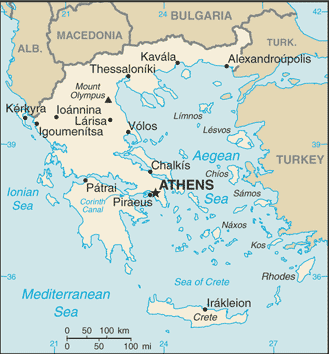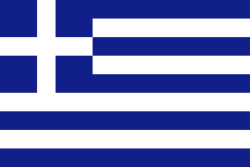Greece - Hellenic Republic
Related Categories:
 Presidency of the Hellenic Republic
Presidency of the Hellenic RepublicFlag and emblem.
www.presidency.gr/
Origin and meaning of the Greek flag.
www.fotw.us/
Greece lies at the juncture of Europe, Asia, and Africa. It is heir to the heritages of classical Greece, the Byzantine Empire, and nearly four centuries of Ottoman rule.
en.wikipedia.org/
Greece was inhabited as early as the Paleolithic period and by 3000 BC had become home, in the Cycladic Islands, to a culture whose art remains among the most evocative in world history. In the second millennium BC, the island of Crete nurtured the maritime empire of the Minoans, whose trade reached from Egypt to Sicily. The Minoans were supplanted by the Mycenaeans of the Greek mainland, who spoke a dialect of ancient Greek. During the Roman, Byzantine, and Ottoman Empires (1st-19th centuries), Greece's ethnic composition became more diverse. The roots of Greek language and culture date back at least 3,500 years, and modern Greek preserves many elements of its classical predecessor.
Eastern Orthodox Christianity is the dominant religion in Greece and receives state funding. During the centuries of Ottoman domination, the Greek Orthodox Church preserved the Greek language and cultural identity and was an important rallying point in the struggle for independence. There is a centuries-old Muslim religious minority concentrated in Thrace and an estimated 300,000 Muslim immigrants living elsewhere in the country. Smaller religious communities in Greece include Old Calendar Orthodox, Catholics, Protestants, Jews, Jehovah's Witnesses, and Mormons.
Greek education is free and compulsory for children between the ages of 6 and 15. Overall responsibility for education rests with the Ministry of National Education and Religious Affairs. Private colleges and universities (mostly foreign) do have campuses in Greece despite the fact that their degrees are not recognized by the Greek state. Entrance to public universities is determined by state-administered exams.
www.state.gov/r/
Introduction
About
Contact
Symbols in The News
Interpret this Symbol
AAC
African
AI
Alchemy
Alphabets
Ancient
Animal Symbolism
Architecture
Art
Articles
Astrology
Baha'i
Blissymbolics
Blueprint Symbols
Buddhist
Celtic Symbols
Cemetery
Chinese Symbols
Christian
Circle
City
Codes
Color
Conlangs
Crop Circles
Danger
Da Vinci Code
Designing Logos
Dictionaries
Dreams
Education
Egyptian Symbols
Electrical
Emoticons
Find Images
Fonts
Food
Fraternity
Hamsa
Healing
Heraldry
Hermetic
Highway Signs
Hindu
History
Hobo
Holiday
Icons
iConji
Islamic
Jain Symbols
Japanese, Kanji
Jewish
Justice
Law
Literary Symbolism
Mandalas
Map
Masonic
Math, Number
Meaning of Names
Medical
Middle East
Military
Miscellaneous
Money
Music
Mythology
Native American
Playing Cards
Power
Psychology
QiQiiKhu
Reiki
Religious
Runes, Norse
Sacred Geometry
Scientific
Science Fiction
Sorority
Sports
Symbols in the News
Tattoos
ThirteenSymbols
Tree of Life
Ursprache
Videos
Visual Languages
Weather
Web Codes
Wicca
Words
Writing Systems
Braille
Coinherence
Coptic
Cuneiform
Easter Island
Etruscan
Happy Human
Hebrew
Kokopelli
Linear B
Lotus
Love Symbols
Mandorla
Moon Alphabet
Nine Pointed Star
Om
Oz
Phonetic
Scarab Beetle
Silent
Theosophy
Unifon
About
Contact
Symbols in The News
Interpret this Symbol
AAC
African
AI
Alchemy
Alphabets
Ancient
Animal Symbolism
Architecture
Art
Articles
Astrology
Baha'i
Blissymbolics
Blueprint Symbols
Buddhist
Celtic Symbols
Cemetery
Chinese Symbols
Christian
Circle
City
Codes
Color
Conlangs
Crop Circles
Danger
Da Vinci Code
Designing Logos
Dictionaries
Dreams
Education
Egyptian Symbols
Electrical
Emoticons
Find Images
Fonts
Food
Fraternity
Hamsa
Healing
Heraldry
Hermetic
Highway Signs
Hindu
History
Hobo
Holiday
Icons
iConji
Islamic
Jain Symbols
Japanese, Kanji
Jewish
Justice
Law
Literary Symbolism
Mandalas
Map
Masonic
Math, Number
Meaning of Names
Medical
Middle East
Military
Miscellaneous
Money
Music
Mythology
Native American
Playing Cards
Power
Psychology
QiQiiKhu
Reiki
Religious
Runes, Norse
Sacred Geometry
Scientific
Science Fiction
Sorority
Sports
Symbols in the News
Tattoos
ThirteenSymbols
Tree of Life
Ursprache
Videos
Visual Languages
Weather
Web Codes
Wicca
Words
Writing Systems
Braille
Coinherence
Coptic
Cuneiform
Easter Island
Etruscan
Happy Human
Hebrew
Kokopelli
Linear B
Lotus
Love Symbols
Mandorla
Moon Alphabet
Nine Pointed Star
Om
Oz
Phonetic
Scarab Beetle
Silent
Theosophy
Unifon

